高中英语--句子类型
高中基础语法知识--英语句子种类 共14张PPT

(二)采用情态动词或半助动词来软化口气 He might be right. 他也许是对的。 She seems to be unhappy. 她似乎不快活。
Don't let him go. / Let him not go. 别让他走。
感叹句: what和how引导的感叹句
一、由感叹词what引导的感叹句。(修饰名词) 1.What+a/an+(形容词)+单数可数名词+主语+谓语!
如: What a fine day it is! 2. What+(形容词)+可数名词复数或不可数名词+主语+谓语!
疑问句: 分为一般疑问句和特殊疑问句
一般疑问句:be动词/助动词/情态动词开头的疑问句。 回答:yes/no。 特殊疑问句:特殊疑问词+一般疑问句。 回答:根据相关的句子意思进行相应的回答即可。
将陈述句变为 一般疑问句
1.带be动词的陈述句: she is a student 注意:I am a student
2.表转折关系的 but, however,while,still, yet The film is not perfect,still,it's good.
3.表选择关系的 or, either...or..., not...but... Take the chance,or you will regret it.
英语中千变万化的句子归根结底都是由以上五种基本句型组合、扩展、变化而来的
高中英语五种基本句型

高中英语五种基本句型
高中英语学习中,五种基本句型是学习英语语法的重点
内容之一。
五种基本句型分别是简单句、并列句、复合句、介词短语和动名词短语。
下面将分别进行介绍。
一、简单句
简单句是英语语言学中最简单的句型,由主语和谓语构成。
例如:I am a student.我是一名学生。
二、并列句
并列句由两个或多个简单句通过并列连词连接成一个句子,构成并列关系。
例如:I like to play basketball, and my brother likes to play soccer.我喜欢打篮球,我的兄弟喜
欢踢足球。
三、复合句
复合句至少由一个主句和一个从句构成。
主句和从句之间通过连接词连接,构成了从属关系。
例如:After I finish my homework, I will go to bed.我做完作业后就去睡觉。
四、介词短语
介词短语由介词和宾语组成,可以用来修饰名词、代词或动词。
例如:The book on the table is mine.桌子上的书是我的。
五、动名词短语
动名词短语以动词-ing形式作为主语、宾语或表语。
例如:Playing basketball is my favorite activity.打篮球是我
最喜欢的活动。
以上就是英语语法中的五种基本句型,了解并正确运用这五种句型对于学习英语语法非常重要。
高中英语固定句型大全
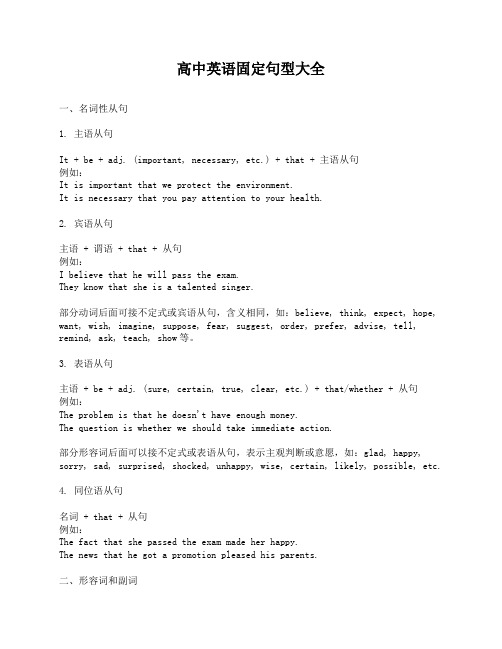
高中英语固定句型大全一、名词性从句1. 主语从句It + be + adj. (important, necessary, etc.) + that + 主语从句例如:It is important that we protect the environment.It is necessary that you pay attention to your health.2. 宾语从句主语 + 谓语 + that + 从句例如:I believe that he will pass the exam.They know that she is a talented singer.部分动词后面可接不定式或宾语从句,含义相同,如:believe, think, expect, hope, want, wish, imagine, suppose, fear, suggest, order, prefer, advise, tell, remind, ask, teach, show等。
3. 表语从句主语 + be + adj. (sure, certain, true, clear, etc.) + that/whether + 从句例如:The problem is that he doesn't have enough money.The question is whether we should take immediate action.部分形容词后面可以接不定式或表语从句,表示主观判断或意愿,如:glad, happy, sorry, sad, surprised, shocked, unhappy, wise, certain, likely, possible, etc.4. 同位语从句名词 + that + 从句例如:The fact that she passed the exam made her happy.The news that he got a promotion pleased his parents.二、形容词和副词1. 形容词的比较级和最高级比较级:主语 + be (am, is, are) + 形容词比较级 + than + 被比较的对象例如:She is taller than her sister.This book is more interesting than that one.最高级:主语 + be (am, is, are) + the + 形容词最高级 + 名词例如:He is the tallest boy in his class.This is the most beautiful painting I have ever seen.2. 常用的形容词和副词beautiful, handsome, pretty, ugly, lovely, attractive, stunning, gorgeous, charming, cute, elegant, fashionable, stylish, glamorous, delightful, etc.good, great, excellent, wonderful, fantastic, fabulous, amazing, awesome, splendid, terrific, marvelous, etc.bad, terrible, awful, horrible, unpleasant, etc.expensive, cheap, reasonable, affordable, etc.fast, slow, quick, rapid, swift, etc.loud, quiet, noisy, etc.hard, easy, difficult, challenging, simple, complicated, complex, etc.high, low, tall, short, long, big, small, huge, tiny, etc.young, old, new, ancient, modern, etc.3. 形容词和副词的用法形容词可修饰名词,也可作表语副词一般修饰动词、形容词或其他副词三、倒装句1. 完全倒装句在以下情况下要使用完全倒装句:a) 句首为表示地点、方式等的介词短语时例如:Under the tree were two cats.In this way, we can solve the problem.b) 句首为表示方位的副词或介词短语时例如:Here comes the bus.Out rushed the students.c) 句首为表示否定、副词only、hardly, seldom, never等时例如:Never have I seen such a beautiful sunset.Not only does he play the piano well, but he also sings well.d) 句首为so, neither, nor时例如:So busy was he that he forgot to eat lunch.Neither do I like English, nor do I like math.2. 部分倒装句在以下情况下要使用部分倒装句:a) 句首为表示条件的介词短语时例如:Should you need any help, please let me know.Had I known your address, I would have sent you a postcard.b) 句首为表示时间的介词短语或副词短语时例如:At no time should you give up your dream.On no account can he stay out late.四、虚拟语气1. 条件句中的虚拟语气a) “与事实相反的条件句”:如果对过去的情况进行虚拟,主句要用“动词的过去完成时”,从句用“动词的过去完成时”或“would/could/might + have + 过去分词”的形式。
50个高中英语高级句型及例句
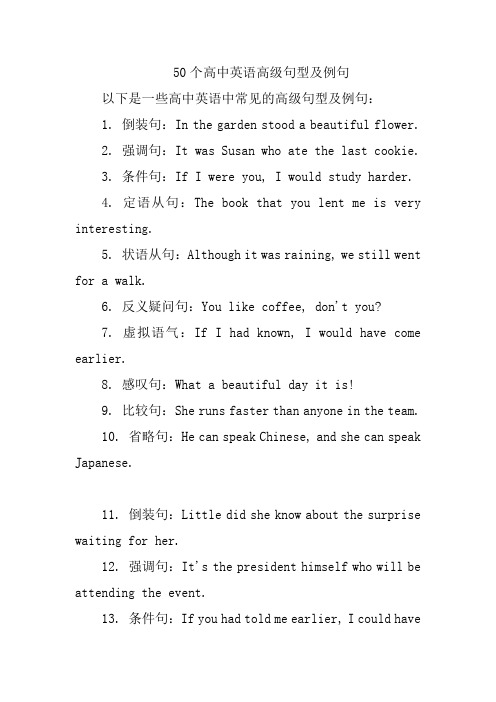
50个高中英语高级句型及例句以下是一些高中英语中常见的高级句型及例句:1. 倒装句:In the garden stood a beautiful flower.2. 强调句:It was Susan who ate the last cookie.3. 条件句:If I were you, I would study harder.4. 定语从句:The book that you lent me is very interesting.5. 状语从句:Although it was raining, we still went for a walk.6. 反义疑问句:You like coffee, don't you?7. 虚拟语气:If I had known, I would have come earlier.8. 感叹句:What a beautiful day it is!9. 比较句:She runs faster than anyone in the team.10. 省略句:He can speak Chinese, and she can speak Japanese.11. 倒装句:Little did she know about the surprise waiting for her.12. 强调句:It's the president himself who will be attending the event.13. 条件句:If you had told me earlier, I could havehelped.14. 定语从句:The car which crashed into the wall was badly damaged.15. 状语从句:While I was studying, my brother was playing video games.16. 反义疑问句:You don't like coffee, do you?17. 虚拟语气:If I were you, I wouldn't do that.18. 感叹句:How beautifully the flowers bloomed in the garden!19. 比较句:She sings as well as her sister does.20. 省略句:He can play the guitar; she, the piano.21. 倒装句:Never have I seen such a beautiful sunset before.22. 强调句:It is your responsibility to ensure the project's success.23. 条件句:Should you need any further assistance, please let us know.24. 定语从句:The person who stole my wallet has been caught.25. 状语从句:As she was running late, she missed the bus.26. 反义疑问句:You've never been there, have you?27. 虚拟语气:If I were a bird, I would fly around the world.28. 感叹句:What a fantastic performance they gave last night!29. 比较句:This book is more interesting than the one I read last week.30. 省略句:He loves swimming; his sister, dancing.31. 倒装句:Under the tree sat a man reading a book.32. 强调句:It was the best movie I have ever seen.33. 条件句:Unless you study hard, you won't pass the exam.34. 定语从句:The house where I grew up has been renovated.35. 状语从句:Whenever it rains, he stays indoors.36. 反义疑问句:You don't mind me borrowing your book, do you?37. 虚拟语气:If I hadn't missed the train, I would have been on time.38. 感叹句:How incredible the view from the top of the mountain is!39. 比较句:His performance is superior to that ofhis colleagues.40. 省略句:She likes playing the piano; he, the guitar.41. 倒装句:In the middle of the road lay a stray dog.42. 强调句:It was him who suggested the idea in the first place.43. 条件句:Suppose you were given a second chance, what would you do?44. 定语从句:The girl whose bag was stolen reported the incident to the police.45. 状语从句:Since it was a holiday, the streets were deserted.46. 反义疑问句:You won't be late for the meeting, will you?47. 虚拟语气:If I were in your shoes, I would have made the same decision.48. 感叹句:What a lovely surprise you've prepared for me!49. 比较句:This computer is more efficient than the one I used before.50. 省略句:He can swim; she, on the other hand, can't.这些句型可以帮助提高句子的表达力和复杂度,使文章更加丰富多彩。
高中英语五种基本句型

高中英语五种基本句型高中英语的五种基本句型,即简单句、并列句、复合句、感叹句和疑问句,在日常英语交流中十分常见。
下面,我将详细介绍这五种句型的特点和用法。
一、简单句简单句是指只包含一个主语和一个谓语的句子。
它是最基本的句子结构,也是我们最常用的句型之一。
简单句通常用于表达简单的事实或信息。
例如:1. I love you.(我爱你。
)2. She is a doctor.(她是一名医生。
)3. They are students.(他们是学生。
)在这些句子中,“I”、“She”和“They”是主语,“love”、“is”和“are”是谓语,分别表示动作和状态。
二、并列句并列句是由两个或更多的简单句通过并列连词(如and、but等)连接而成的句子。
并列句可以用来表达两个或多个相互独立的想法或事件,通常用于描述并列或对比关系。
例如:1. He is tall and handsome.(他高大帅气。
)2. I want to buy a new car, but I don't have enough money.(我想买一辆新车,但我没钱。
)3. She is studying English and Chinese.(她正在学习英语和中文。
)在这些句子中,“He”、“I”和“She”是主语,“is”和“want”是谓语,“tall”和“handsome”、“to buy”和“don't have”、”studying”和“English and Chinese”是并列的两个信息。
三、复合句复合句是由一个主句和一个或多个从句组成的句子。
从句可以是名词性从句、形容词从句或副词从句。
复合句通常用于表达复杂的思想或信息。
例如:1. I know that he is coming tomorrow.(我知道他明天来。
)2. She is wearing the dress which she bought last week.(她穿着上周买的那件裙子。
高中英语英语五种基本句型及练习
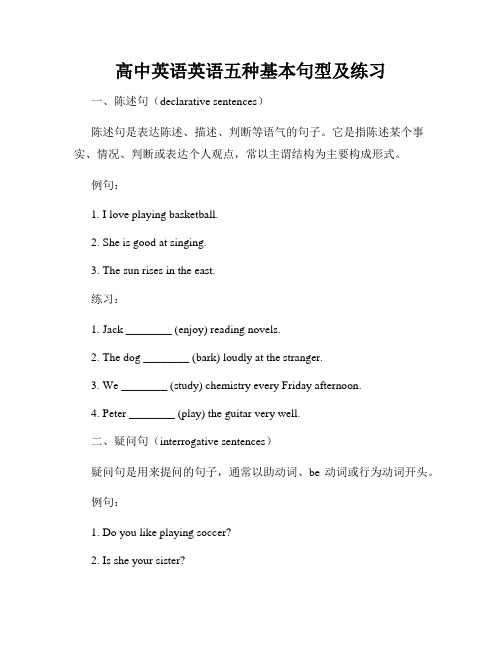
高中英语英语五种基本句型及练习一、陈述句(declarative sentences)陈述句是表达陈述、描述、判断等语气的句子。
它是指陈述某个事实、情况、判断或表达个人观点,常以主谓结构为主要构成形式。
例句:1. I love playing basketball.2. She is good at singing.3. The sun rises in the east.练习:1. Jack ________ (enjoy) reading novels.2. The dog ________ (bark) loudly at the stranger.3. We ________ (study) chemistry every Friday afternoon.4. Peter ________ (play) the guitar very well.二、疑问句(interrogative sentences)疑问句是用来提问的句子,通常以助动词、be动词或行为动词开头。
例句:1. Do you like playing soccer?2. Is she your sister?3. Where is the nearest supermarket?练习:1. ________ you watch TV last night?2. ________ the weather like today?3. ________ Tim have a new car?三、祈使句(imperative sentences)祈使句是用来表达命令、请求、建议等意思的句子。
它通常以动词原形开头。
例句:1. Please close the door.2. Study hard for the exam.3. Let's go for a walk.练习:1. ________ your homework before going to bed.2. ________ your parents for permission before going out.3. ________ up early tomorrow.四、感叹句(exclamatory sentences)感叹句用来表达强烈的感情、惊奇、赞美、喜悦等。
高中英语句型结构大全
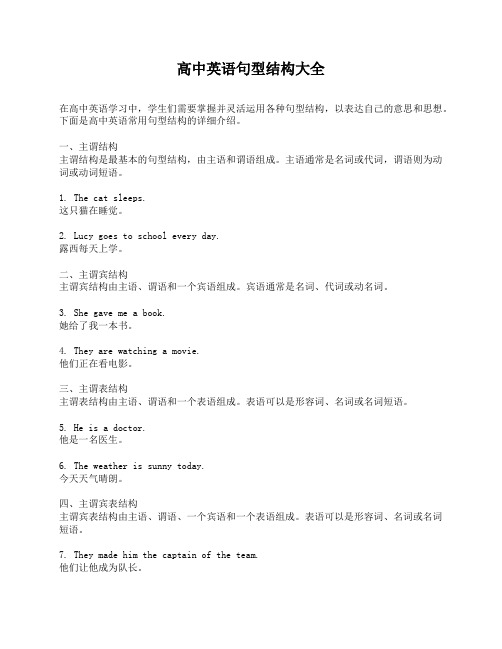
高中英语句型结构大全在高中英语学习中,学生们需要掌握并灵活运用各种句型结构,以表达自己的意思和思想。
下面是高中英语常用句型结构的详细介绍。
一、主谓结构主谓结构是最基本的句型结构,由主语和谓语组成。
主语通常是名词或代词,谓语则为动词或动词短语。
1. The cat sleeps.这只猫在睡觉。
2. Lucy goes to school every day.露西每天上学。
二、主谓宾结构主谓宾结构由主语、谓语和一个宾语组成。
宾语通常是名词、代词或动名词。
3. She gave me a book.她给了我一本书。
4. They are watching a movie.他们正在看电影。
三、主谓表结构主谓表结构由主语、谓语和一个表语组成。
表语可以是形容词、名词或名词短语。
5. He is a doctor.他是一名医生。
6. The weather is sunny today.今天天气晴朗。
四、主谓宾表结构主谓宾表结构由主语、谓语、一个宾语和一个表语组成。
表语可以是形容词、名词或名词短语。
7. They made him the captain of the team.他们让他成为队长。
8. We elected her president of the club.我们选她为俱乐部主席。
五、主谓双宾结构主谓双宾结构由主语、谓语和两个宾语组成。
其中一个宾语通常是人,另一个是物。
9. She bought me a gift.她给我买了一份礼物。
10. He taught his students English.他教他的学生英语。
六、There be结构There be结构用于描述某个地方存在或发生的事情。
它由there + be构成,be后面是主语。
11. There is a cat in the garden.花园里有一只猫。
12. There are two books on the table.桌子上有两本书。
【高中英语】高中英语语法之句子的种类
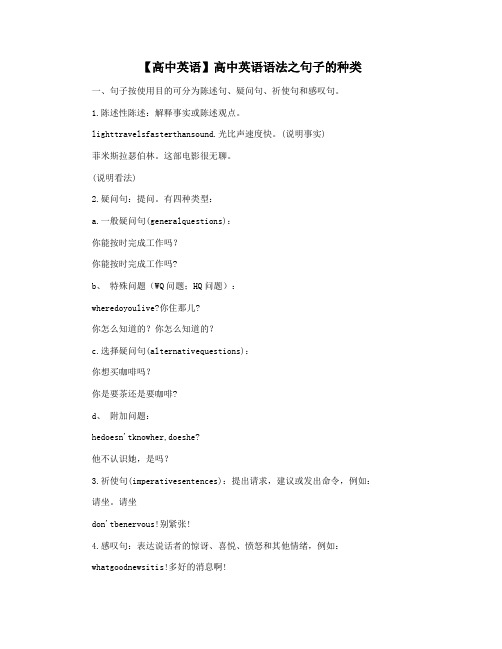
【高中英语】高中英语语法之句子的种类一、句子按使用目的可分为陈述句、疑问句、祈使句和感叹句。
1.陈述性陈述:解释事实或陈述观点。
lighttravelsfasterthansound.光比声速度快。
(说明事实)菲米斯拉瑟伯林。
这部电影很无聊。
(说明看法)2.疑问句:提问。
有四种类型:a.一般疑问句(generalquestions):你能按时完成工作吗?你能按时完成工作吗?b、特殊问题(WQ问题;HQ问题):wheredoyoulive?你住那儿?你怎么知道的?你怎么知道的?c.选择疑问句(alternativequestions):你想买咖啡吗?你是要茶还是要咖啡?d、附加问题:hedoesn'tknowher,doeshe?他不认识她,是吗?3.祈使句(imperativesentences):提出请求,建议或发出命令,例如:请坐。
请坐don'tbenervous!别紧张!4.感叹句:表达说话者的惊讶、喜悦、愤怒和其他情绪,例如:whatgoodnewsitis!多好的消息啊!二、句子按结构可分为以下三类:1.简单句(simplesentences):只包含一个主谓结构句子叫简单句,例如:她收集邮票。
她喜欢集邮。
thefoodwasgood,buthehadlittleappetite.食物很精致,但他胃口不大。
thefilmhadbegunwhenwegottothecinema.当我们到达电影院时,电影已经开始了。
三、基本句型(basicsentencepatterns):英语中千变万化的句子归根结底都是由以下五种基本句型组合、扩展、变化而来的:1.主+动态(SV),例如:iwork.我工作。
2.主+动态+表格(SVP),例如:johnisbusy.约翰忙。
主语+宾语(例如:shestudiesenglish.她学英语。
4.主语+动词+宾语+补语(SVOC),例如:timewouldprovemeright.时间会证明我是对的。
高中英语六种基本句型结构

英语学习中的六种基本句型结构英语的句式从表达形式上来看,形式多样且丰富多彩,但仔细观察后就不难发现,无论其怎样变化,它们大都基本保持了常见的六个句型结构;也就是说,绝大多数英语句子都是由这六个基本句式演变、衍生而成的;因此,掌握好这六个基本句型以及他们的基本用法,对于初学英语的同学们来说,就显得非常重要了;这里做一简单列举与说明,希望对同学们的学习有所帮助:英语五种基本句型列式如下:一:SV主+谓主语——动词二:SVP主+系+表主语——动词——表语三:SVO主+谓+宾主语——动词——宾语四:SVoO主+谓+间宾+直宾主语——动词——宾语——宾语五:SVOC主+谓+宾+宾补主语——动词——宾语——补语六:There be + 主语+ 其它一、句型1:Subject 主语+Verb 谓语这种句型中的动词大多是不及物动词,常见的动词如:work,sing,swim,fish,jump,arrive,come,die,disappear,cry,happen等;如:1 Li Ming works very hard;李明学习很努力;2 The little girl cried even harder;小女孩哭得更厉害了;3 The accident happened yesterday afternoon;事故是昨天下午发生的;1、The sun is rising;2、I'll try;3、Did you sleep wellwell做状语,修饰不及物动词sleep4、The engine broke down;注意:在此句型中,有少数不及物动词表达被动含义,表达主语本身所具有的特性,不用被动语态;1、The book sells well;2、The window won't shut;3、The pen writes smoothly;4、Cheese cuts easily;二、句型2:Subject 主语+ Link、V系动词+ Predicate表语这种句型主要用来表示主语的特点、身份等;其系动词一般可分为下列两类:1表示状态;这样的词有:be,look,seem,smell,taste,sound,keep等;如:1 This kind of food tastes delicious、这种食物吃起来很可口;2 He looked worried just now、刚才他看上去有些焦急;2表示变化;这类系动词有:become,turn,get,grow,go等;如:1 Spring comes、It is getting warmer and warmer;春天到了,天气变得越来越暖和;2 The tree has grown much taller than before;这棵树比以前长得高多了;1、Mr、Brown is an engineer;名词做表语2、Gradualy he became silent;形容词做表语3、She remained standing for a hour;现在分词做表语4、The question remained unsolved;过去分词做表语5、The machine is out of order;介词短语做表语6、The television was on;副词做表语7、His plan is to keep the affair secret;动词不定式做表语8、My job is repairing cars;动名词做表语9、The question is what you want to do;从句做表语,即:表语从句注意:在下面的句子中,形容词做表语,在表语的后面常常接不定式结构;I'm happy to meet you;They are willing to help;We are determined to follow his example;三、句型3:Subject主语+ Verb 谓语+ Object 宾语这种句型中的动词一般为及物动词;其宾语通常由名词、代词、动词不定式、动名词或从句等来充当;例:1 He took his bag and left;名词他拿着书包离开了;2 Li Lei always helps me when I have difficulties;代词当我遇到困难时,李雷总能给我帮助;3 She plans to travel in the coming May Day;不定式她打算在即将到来的“五一”外出旅游;4 I don’t know what I should do next;从句我不知道下一步该干什么;1、Do you know these peoplethem名词或代词做宾语2、I can't express myself in English;反身代词做宾语3、He smiled a strange smile;同源宾语4、We can't afford to pay such a price;不定式做宾语5、Would you mind waiting a few minutes动名词做宾语6、I hope that I have said nothing to pain you;从句做宾语,即:宾语从句注意:并不是所有的及物动词都可以接上述各种情况做宾语,不同的动词有不同的用法,所以,在学习动词时,一定要掌握其用法;四、句型4: Subject主语+Verb谓语+Indirect object间接宾语+Direct object 直接宾语这种句型中,直接宾语为主要宾语,在句中不可或缺,常常由表示“物”的名词来充当;间接宾语也被称之为第二宾语,去掉之后,对整个句子的影响不大,多由指“人”的名词或代词承担;引导这类双宾语的常见动词有:buy,pass,lend,give,tell,teach,show,bring,send等;如:1 Her father bought her a dictionary as a birthday present;她爸爸给她买了一本词典作为生日礼物;2he old man always tells the children stories about the heroes in the Long March;老人经常给孩子们讲述长征途中那些英雄的故事;上述句子还可以表达为:1Her father bought a dictionary for her as a birthday present;2The old man always tells stories about the heroes to the children in the Long March;在此句型中,动词可以称作双宾语动词,在英语中,这样的动词并不多,在学习遇时,要牢记;后面的宾语为间接宾语和直接宾语,其中间接宾语在前,一般表人,直接宾语在后,一般表物;这类句型有三种情况;第一种情况,间接宾语可以改为to引导的短语;1、He handed me a letter;He handed a letter to me;2、She gave me her telephone number;She gave her telephone number to me;第二种情况,间接宾语可以改为for引导的短语;3、She sang us a folk song;She sang a folk for us;4、She cooked us a delicious meal;She cooked a delicious meal for us;第三种情况,直接宾语可以由宾语从句充当;5、Tell him I'm out;6、Can you inform me where Miss Green lives五、句型5:Subject主语+Verb 动词+Object 宾语+Complement补语这种句型中的“宾语+补语”统称为“复合宾语”;宾语补足语的主要作用或者是补充、说明宾语的特点、身份等;或者表示让宾语去完成的动作等;担任补语的常常是名词、形容词、副词、介词短语、分词、动词不定式等;如:1You should keep the room clean and tidy;你应该让屋子保持干净整洁;形容词2 We made him our monitor;名词我们选他当班长;3 His father told him not to play in the street;不定式他父亲告诉他不要在街上玩;●常见的动词有:tell,ask,advise,help,want,would like,order,force,allow等;●注意:动词have,make,let,see,hear,notice,feel,watch等后面所接的动词不定式作宾补时,不带to;如:1 The boss made him do the work all day;老板让他整天做那项工作;2 I heard her sing in the next room all the time last night;昨天晚上我听见她在隔壁唱了一个晚上;在此句型中的动词,叫做可以跟复合宾语的动词,在英语中,这样的动词也不多;后面的宾语补足语是说明宾语的情况的,宾语和宾语补足语一起被称做复合宾语;这个句式是英语中比较复杂的一个句式,因为复合宾语的构成内容较多;下面句子中划线部分为宾语补足语;1、He found his new job boring;形容词做宾补2、They called their daughter Mary;名词做宾补3、This placed her in a very difficult position;介词短语做宾补4、We went to her house but found her out;副词做宾补5、What do you advise me to do不定式做宾补6、We thought him to be an honest man;tobe做宾补7、He believed them to have discussed the problem;不定式的完成式做宾补8、He believed her to be telling the truth;不定式的进行式做宾补9、Did you notice him come in不带to的不定式做宾补10、I saw her chatting with Nancy;现在分词做宾补11、He watched the piano carried upstairs;过去分词做宾补注意:在这个结构中,可以出现用it做形式上的宾语,把真正的宾语放在宾语补足语的后面;在此结构中,宾语常常是动词不定式或宾语从句;1、He felt it his duty to mention this to her;分析:it是形式宾语,his duty是宾语补足语,to mention this to her是真正的宾语;2、I think it best that you should stay with us;分析:it是形式宾语,best是宾语补足语,that you should stay with us是真正的宾语;注意:习惯用语的使用在英语中,有很多动词习惯用语,在学习的过程中,要注意它们的使用,不必分析单独每个词的使用;例:We are short of money;be short of中short做表语She is always making trouble for her friends;trouble做make的宾语He has carried out our instructions to the letter;our instructions做词组carry out的宾语We are waiting for the rain to stop;wait for后面的the rain是宾语,to stop是宾语补足语2、在英语中,大多数动词既可以做及物动词又可以做不及物动词,而且还会有一些固定词组,因此一个动词可以用于几种句型;例:ask①Did you ask the price直接接名词做宾语②She asked them their names;接双宾语③I asked James to buy some bread;接宾语加不定式做宾语补足语④I asked to speak to Fred;接不定式做宾语⑤Didn't you ask him in在此句中和副词in连用⑥He has asked for an interview with the President;组成固定词组ask for3、There be句型是一种特殊的句子,真正的主语在后面,含义为“有…”①谓语动词和主语保持一致:There is a television in the sitting room;②有两个或更多的主语时,动词一般和最近的一个保持一致:There are two girls and a boy dancing in the hall;③主语的后面有时有修饰语:There are a lot of difficulties facing us;There were many things to be done此处也可以使用to do;④谓语动词be可以有时态的变化:There will be a concertin the park tonight;There was littlechange in him;⑤谓语也可以有不定式构成的复合谓语;There used to be a cinema here;There seems to be something the matter with her;Is there going to be any activity tonight⑥there be句式变疑问句,把be提前;变翻译疑问句也要借助there;Is there any hope of getting the jobThere is nothing wrong with your watch,is there⑦there be句型中也可以使用诸如:live,follow,come,stand,sit,exist等不及物动词:Once upon a time,there lived a fisherman on the island;There came a knock at the door;At the top of the hill there stands an old temple;⑧用于非谓语的情况下,有时用不定式的复合结构there to be或动名词的复合结构和独立主格结构there being:You wouldn't want there to be another war;不定式的复合结构The teacher was satisfied with there being no mistakes in his homework;动名词的复合结构There being nothing else to do,we went home;独立主格结构六、句型6:There be + 主语 + 其它这一结构表示“某地有某物”;主语一般位于there be 之后;值得关注的是,当句中有两个或更多的主语时,动词一般和最近的一个保持一致:1) There are two girls and a boy running on the playground;巩固性练习请判断下列句子的结构类型1、He is running;2、The loud voice from the upstairs made him angry;3、The little boy is asking the teacher all kinds of questions;4、She seemed angry;5、My father bought me a beautiful present;6、Why do you keep your eyes closed7、Will you tell us an exciting story8、We must keep our classroom tidy and clean;9、I heard the baby crying in the sitting room;10、Can you push the window open答案:1、主语---动词2、主语---动词---宾语---补语3、主语---动词---宾语---宾语4、主语---动词----表语5、主语---动词---宾语---宾语6、主语---动词---宾语---宾语7、主语---动词---宾语---补语8、主语---动词---宾语---补语9、主语---动词---宾语---补语10、主语---动词---宾语---补语。
高中英语-句子成分及五种基本句型-课件

句子包括哪些成分?
句子成分详解表
句子成分
意义
充当词类
例句
主语
谓语 宾语 表语 定语 状语
表示句子说的是什么人或什么 事
说明主语做什么,是什么或怎 么样 表示动作行为的对象 与联系动词连用,一起构成谓 语,说明主语是什么,怎么样 用来修饰名词或代词
修饰动词,形容词,副词,表 示动作发生的时间,地点,原 因,目的,方式,结果等
名,代,数,不定 式,动名词,短语或 句子 动词或动词词组
同主语 同主语
形,代,数,名, 副,介词短语或句子 副词,介词短语或句 子
We study in HuangQiao Middle School.
She is dancing under the tree.
Both of us like English. Her father is a chemist. His words sound reasonable. We have eight lessons every day.
1.She lived a happy life.(名词 ) 2.I love you.( 代词) 3.We need two.( 数词) 4.Do you mind my opening the door?(动名词) 5.He began to learn English a year ago.(不定式 ) 6.He did not know what to say.( 疑问词+不定式) 7.Did you write down what she said? ( 从句 ) 8. She felt it her duty to take good care of them.
句子成分(2)
高中英语常见句型结构总结
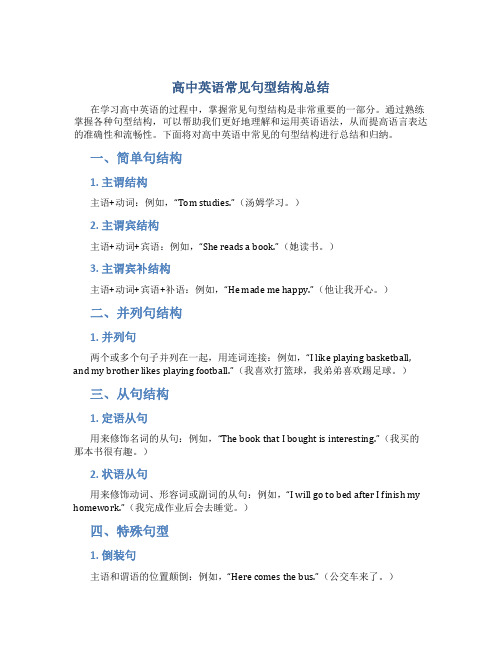
高中英语常见句型结构总结在学习高中英语的过程中,掌握常见句型结构是非常重要的一部分。
通过熟练掌握各种句型结构,可以帮助我们更好地理解和运用英语语法,从而提高语言表达的准确性和流畅性。
下面将对高中英语中常见的句型结构进行总结和归纳。
一、简单句结构1. 主谓结构主语+动词:例如,“Tom studies.”(汤姆学习。
)2. 主谓宾结构主语+动词+宾语:例如,“She reads a book.”(她读书。
)3. 主谓宾补结构主语+动词+宾语+补语:例如,“He made me happy.”(他让我开心。
)二、并列句结构1. 并列句两个或多个句子并列在一起,用连词连接:例如,“I like playing basketball, and my brother likes playing football.”(我喜欢打篮球,我弟弟喜欢踢足球。
)三、从句结构1. 定语从句用来修饰名词的从句:例如,“The book that I bought is interesting.”(我买的那本书很有趣。
)2. 状语从句用来修饰动词、形容词或副词的从句:例如,“I will go to b ed after I finish my homework.”(我完成作业后会去睡觉。
)四、特殊句型1. 倒装句主语和谓语的位置颠倒:例如,“Here comes the bus.”(公交车来了。
)2. 强调句强调句型的构造:例如,“It is Tom who won the game.”(赢得比赛的是汤姆。
)在学习英语句型结构时,要注意识别各种句型的特点,并结合实际情况进行灵活运用。
通过不断的练习和积累,我们可以逐渐提高对句型结构的把握能力,从而更好地运用英语进行交流和表达。
以上是高中英语常见句型结构的总结,希望对大家的学习有所帮助。
让我们一起努力,提升英语水平!。
高中英语句子成分和句子种类

高中英语句子成分和句子种类
在高中英语中,句子的成分主要包括主语、谓语、宾语、表语、定语、状语和补语。
以下是常见句子种类和其成分的示例:
1.简单句:只包含一个主语和一个谓语。
- 主语 + 谓语:She runs every morning.(主语为She,谓语为runs)
2.并列句:由两个或多个简单句通过连词连接而成。
- 简单句 + 连词 + 简单句:She studies hard, but she still gets low grades.(第一个简单句的主语为She,谓语为studies,第二
个简单句的主语为she,谓语为gets)
3.复合句:包含一个主句和一个或多个从句。
- 主句 + 从句:I will go to the park if it doesn't rain.(主
句的主语为I,谓语为will go;从句的主语为it,谓语为doesn't rain)
4.疑问句:用于提问,通常以动词开头。
- 动词 + 主语 + 其他成分:Do you like ice cream?(动词为Do,主语为you)
5.祈使句:用于发出命令、请求、建议等,通常省略了主语。
- 谓语 + 其他成分:Close the door, please.(谓语为Close)
6.感叹句:表示强烈的情感或感叹,通常以感叹词开头。
- 感叹词 + 主句:What a beautiful sunset!(感叹词为What)
这些只是常见的句子种类和示例,实际上还有其他不同类型的句子,具体的情况需要根据语境和句子的用途来判断。
高中英语五种基本句型及拓展
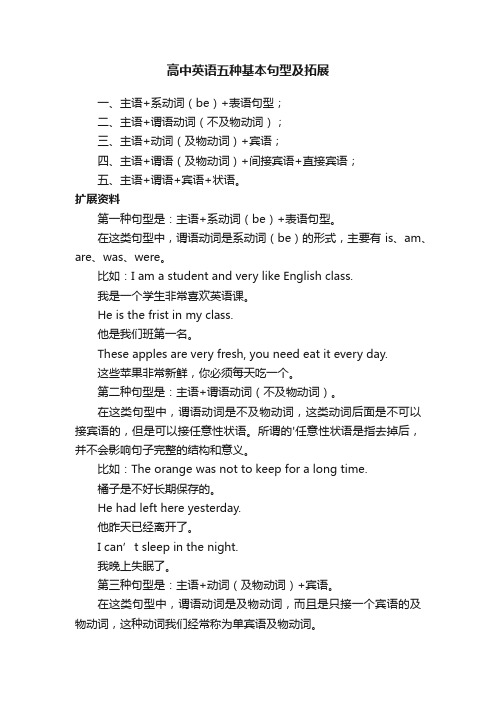
高中英语五种基本句型及拓展一、主语+系动词(be)+表语句型;二、主语+谓语动词(不及物动词);三、主语+动词(及物动词)+宾语;四、主语+谓语(及物动词)+间接宾语+直接宾语;五、主语+谓语+宾语+状语。
扩展资料第一种句型是:主语+系动词(be)+表语句型。
在这类句型中,谓语动词是系动词(be)的形式,主要有is、am、are、was、were。
比如:I am a student and very like English class.我是一个学生非常喜欢英语课。
He is the frist in my class.他是我们班第一名。
These apples are very fresh, you need eat it every day.这些苹果非常新鲜,你必须每天吃一个。
第二种句型是:主语+谓语动词(不及物动词)。
在这类句型中,谓语动词是不及物动词,这类动词后面是不可以接宾语的,但是可以接任意性状语。
所谓的'任意性状语是指去掉后,并不会影响句子完整的结构和意义。
比如:The orange was not to keep for a long time.橘子是不好长期保存的。
He had left here yesterday.他昨天已经离开了。
I can’t sleep in the night.我晚上失眠了。
第三种句型是:主语+动词(及物动词)+宾语。
在这类句型中,谓语动词是及物动词,而且是只接一个宾语的及物动词,这种动词我们经常称为单宾语及物动词。
比如:He had left my hom e yesterday , he can’t tell you.他昨天已经离开我家了,他没有告诉你。
She ate the dinner with her mother.她和她妈妈一起吃的晚饭。
I has left the Beijing by the train.我乘坐火车离开了北京。
高中英语常见句型结构及例句

高中英语常见句型结构及例句一、肯定句结构1. 主语 + be 动词 + 其他•He is a student.•She is studying English.2. 主语 + 动词 + 宾语•She reads a book.•They play basketball.3. 主语 + 动词 + 地点•He lives in the city.•They study at school.二、否定句结构1. 主语 + be 动词 + not + 其他•She is not here.•They are not happy.2. 主语 + do/does/did + not + 动词 + 宾语•I do not like coffee.•He does not play the guitar.三、疑问句结构1. be 动词 + 主语 + 其他?•Are you hungry?•Is she a teacher?2. do/does/did + 主语 + 动词 + 宾语?•Do you like ice cream?•Does he speak Spanish?四、祈使句结构1. 动词原形 + 其他•Open the door.•Study hard.2. Let’s + 动词原形 + 其他•Let’s go to the park.•Let’s eat lunch.五、感叹句结构1. How + 形容词/副词 + 主语 + 动词•How beautiful the flowers are!•How quickly he runs!以上是高中英语常见句型结构及例句的介绍,熟练掌握这些句型结构将有助于提高英语表达能力。
希望同学们能在学习中多实践,多运用,提高自己的英语水平。
高中英语写作系列---六大基本句型
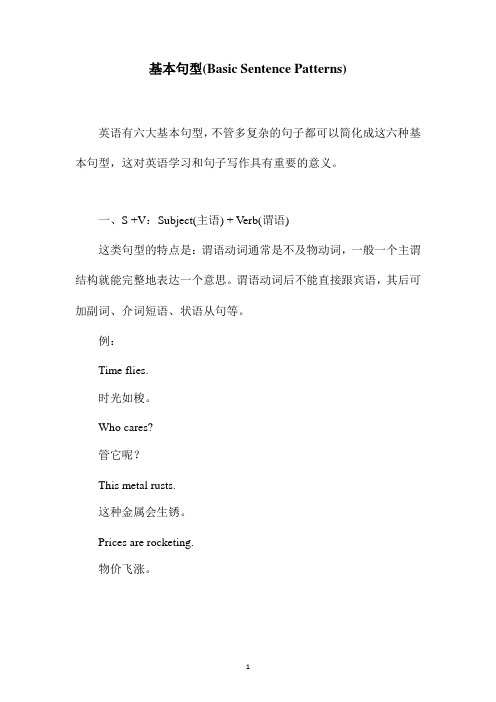
基本句型(Basic Sentence Patterns)英语有六大基本句型,不管多复杂的句子都可以简化成这六种基本句型,这对英语学习和句子写作具有重要的意义。
一、S +V:Subject(主语) + Verb(谓语)这类句型的特点是:谓语动词通常是不及物动词,一般一个主谓结构就能完整地表达一个意思。
谓语动词后不能直接跟宾语,其后可加副词、介词短语、状语从句等。
例:Time flies.时光如梭。
Who cares?管它呢?This metal rusts.这种金属会生锈。
Prices are rocketing.物价飞涨。
二、S+Link V+P:Subject(主语)+Link V(系动词) + Predicate(表语)这类句型的特点是:句子谓语动词都不能表达一个完整的意思,只有加上一个表明主语身份或状态的表语构成复合谓语后,才能表达完整的意思。
这类动词叫做连系动词,简称系动词。
这类句型主要用来表示主语的特点、身份等。
其系动词一般可分为如下六类:1.状态系动词可用来表示主语性质或状态,只有be一词。
例:He is a teacher.他是一名教师。
(表示主语的身份——性质)He is ill.他病了。
(表示主语的状态)2. 持续系动词用来表示主语继续或保持一种状况或态度,主要有keep,rest,remain,stay,lie stand等。
例:Jack always kept weaving dreams at meeting.杰克开会时总是在编织梦想。
This case rests a mystery.这一案件仍是一个谜。
The hunter stood still when the tiger approached him.猎人在老虎靠近时保持不动。
3.表像系动词用来表示“看起来像”这一概念,主要有seem,appear,look等。
例:She looks so uneasy.她看起来很不安。
高中英语句子结构及五种基本句型
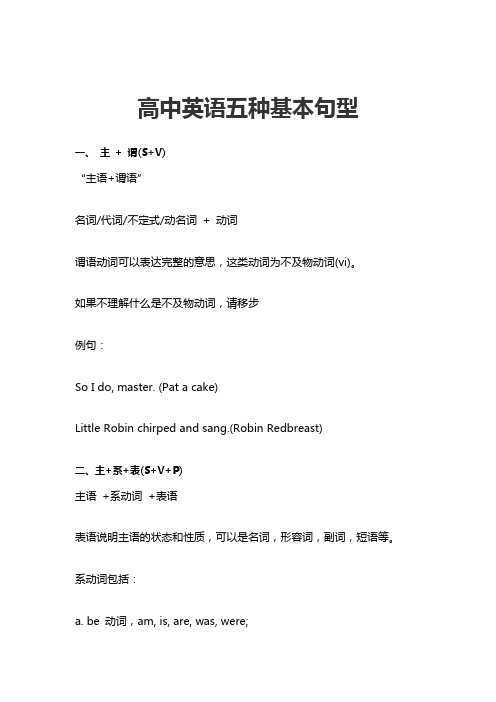
高中英语五种基本句型一、 主 + 谓(S+V)“主语+谓语”名词/代词/不定式/动名词+ 动词谓语动词可以表达完整的意思,这类动词为不及物动词(vi)。
如果不理解什么是不及物动词,请移步例句:So I do, master. (Pat a cake)Little Robin chirped and sang.(Robin Redbreast)二、主+系+表(S+V+P)主语+系动词+表语表语说明主语的状态和性质,可以是名词,形容词,副词,短语等。
系动词包括:a. be 动词,am, is, are, was, were;b. 表感官:feel, smell, sound, taste, look;c. 表变化:become, grow, turn, go, get, fall;d. 表状态:remain, keep, hold, stay, seem.例句:I'm always alone. (Little Jumping Joan)The storms grow stronger. (Lightening Days)He was so small. (Jerry Hall)三、主+谓+宾(S+V+O)主语+谓语+宾语谓语一般为及物动词(vt.),后面必须要跟宾语才能表达完整的意思。
宾语是谓语动词动作的承受者。
例句:They broke my pitcher, and spilt the water, and huffed my mother, and chid her daughter, and kissed my sister instead of me. (A Melancholy Song)I met a man with seven wives. (Going to ST.ives)We'll have a pudding in half an hour. (Come out to Play)March winds and April showersbring forth May flowers. (March winds)四、主+谓+间宾+直宾S+V+IO+O这种句型,谓语动词必须要跟两个宾语才能表达完整意思。
高中英语知识点归纳句子成分的分类和功能
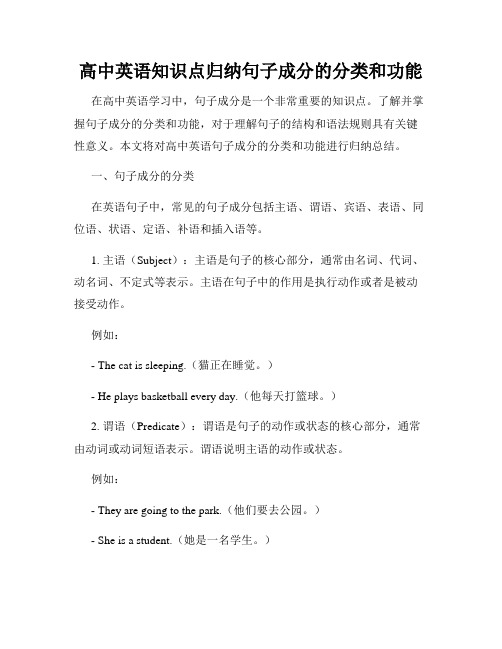
高中英语知识点归纳句子成分的分类和功能在高中英语学习中,句子成分是一个非常重要的知识点。
了解并掌握句子成分的分类和功能,对于理解句子的结构和语法规则具有关键性意义。
本文将对高中英语句子成分的分类和功能进行归纳总结。
一、句子成分的分类在英语句子中,常见的句子成分包括主语、谓语、宾语、表语、同位语、状语、定语、补语和插入语等。
1. 主语(Subject):主语是句子的核心部分,通常由名词、代词、动名词、不定式等表示。
主语在句子中的作用是执行动作或者是被动接受动作。
例如:- The cat is sleeping.(猫正在睡觉。
)- He plays basketball every day.(他每天打篮球。
)2. 谓语(Predicate):谓语是句子的动作或状态的核心部分,通常由动词或动词短语表示。
谓语说明主语的动作或状态。
例如:- They are going to the park.(他们要去公园。
)- She is a student.(她是一名学生。
)3. 宾语(Object):宾语是句子中动作的承受者或影响者,通常由名词、代词、动名词、不定式等表示。
宾语通常回答“谁”或“什么”的问题。
例如:- He bought a new car.(他买了一辆新车。
)- Can you pass me the salt?(你能递给我盐吗?)4. 表语(Predicate complement):表语通常用来补充说明主语的身份、特征或状态,通常由形容词、名词、代词等表示。
表语用来对主语进行补充说明。
例如:- She is happy.(她很开心。
)- The book is interesting.(这本书很有趣。
)5. 同位语(Appositive):同位语通常用来对前面的名词或代词进行解释或补充说明,通常由名词、代词等表示。
同位语用来进一步说明前面的名词或代词。
例如:- My sister, a doctor, lives in New York.(我的姐姐,一名医生,住在纽约。
高中英语语法_句子成分

Our teacher encouraged us to work hard. The boy made his sister cry.
1)、接名词作补足语:call, choose, think,
consider, believe, find, make, etc. 2)、接动词不定式作补足语:see, notice, hear, have, watch, let, make(+do)/ ask, order, require, want, advise, persuade, cause, teach, encourage, permit, allow, forbid, (+to do). 不能用此结构:suggest, demand, hope, agree. 3)、接形容词作补足语:think, believe, find, feel, consider, keep, leave, drive, wish, make, get, paint(粉刷,漆).
It’s
my book, this cover written my name and my school. Have a teacher picked up, bring his office, afterwards, in Monday give me. Although I find box, nothing. I find desk, nothing. She said, this was a driver gave she the bag. In my go home way, …
英语的基本成分有八种:
主语(subject) 谓语(predicate) 宾语(object) 表语(predicative) 定语(attribute) 状语 (adverbial) 补足语 (complement) 同位语(appositive)
高中英语句型大全
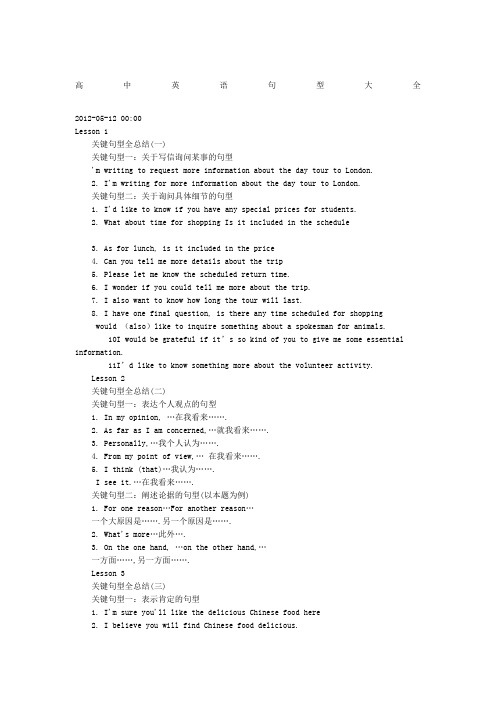
高中英语句型大全2012-05-12 00:00Lesson 1关键句型全总结(一)关键句型一:关于写信询问某事的句型'm writing to request more information about the day tour to London.2. I'm writing for more information about the day tour to London.关键句型二:关于询问具体细节的句型1. I'd like to know if you have any special prices for students.2. What about time for shopping Is it included in the schedule3. As for lunch, is it included in the price4. Can you tell me more details about the trip5. Please let me know the scheduled return time.6. I wonder if you could tell me more about the trip.7. I also want to know how long the tour will last.8. I have one final question, is there any time scheduled for shoppingwould (also)like to inquire something about a spokesman for animals.10I would be grateful if it’s so kind of you to give me some essential information.11I’d like to know something more about the volunteer activity.Lesson 2关键句型全总结(二)关键句型一:表达个人观点的句型1. In my opinion, …在我看来…….2. As far as I am concerned,…就我看来…….3. Personally,…我个人认为…….4. From my point of view,…在我看来…….5. I think (that)…我认为…….I see it.…在我看来…….关键句型二:阐述论据的句型(以本题为例)1. For one reason…For another reason…一个大原因是…….另一个原因是…….2. What's more…此外….3. On the one hand, …on the other hand,…一方面……,另一方面…….Lesson 3关键句型全总结(三)关键句型一:表示肯定的句型1. I'm sure you'll like the delicious Chinese food here2. I believe you will find Chinese food delicious.3. I'm convinced that you'll love Chinese food.5. I bet you will love Chinese food关键句型二:表示为某人提供某物1. We'll provide you with a room of your own with a bed, a desk, a couple of chairs and a TV.2. We'll provide a room with a bed, a desk, a couple of chairs and a TV for you.3. We'll supply you with a room that has a bed, a desk, a couple of chairs and a TV.4. We'll supply a room with a bed, a desk, a couple of chairs and a TV for you.5. We'll prepare a room with a bed, a desk, a couple of chairs, and a TV for you.6. You will have a room of your own with a bed, a desk, a couple of chairs and a TV.关键句型三:表示提供帮助的句型表示提供帮助的句型非常多,我们旨在抛砖引玉,只给出几个参考句型,希望同学们自己努力思考,平时留意悼念相关的句型,为自己增加财富1. Please set me know if you have any questions or requests.2. Just call me if there's anything you need.3. (Please) let me know if there's anything I can help you with.4. Don't hesitate to ask for help if you have any questions or requests.5. I'll be glad to help if you have any questions or requests.6. I'd be glad if I could help.关键句型四:表示尽力做某事的句型1. We'll try our best to make your stay here in Beijing a pleasant experience.2. We'll do everything we can to help you enjoy your stay here in Beijing.3. We'll do all we can to help you have a good time in Beijing.4. We'll do our best to make your stay in Beijing a happy oneLesson 4关键句型一:讲故事开头的句型1. Once upon a time there was a farmer who worked hard in the fields every day.2. There once was a farmer who worked very hard every day.3. Long long ago, there lived a farmer who worked very hard every day.4. One day, the farmer heard something odd as he wad hoeing.关键句型二:陈述学到某种道理的句型1. The story tells us that if you want to get something, you must work hard for it.2. From the story, we learn that only by working hard can we get what we want.3. The story suggests: "No pains, no gains."4. The lesson in this story is that you must work hard to get what you want.Lesson 5关键句型一:表达信息来源的句型1. I read in the newspaper that…learned from the newspaper that…3. By reading today's newspaper that…says in today's newspaper that…关键句型二:提出建议的句型关于提建议的句型非常多,这里我们只给几个适用于这道题的提建议句型:1. I think this is a good chance for you to…2. I'd like to suggest you…3. I think you might like to…4. I was wondering if you'd like to…Jim's Contribution:I think this is a good chance for you to enter the English Speaking Competition.我认为这是你参加英语演讲比赛的一个好机会.关键句型三:主动提供帮助的句型主动提供帮助的句型我们已经在第一课学习了不少,这里我们再给大家提供几个句型:1. If there is anything I can do for you, I would be glad to…2. If there is anything I can do for you, it will be my great pleasure to…3. Just tell me if I can be of any help.4. Don't hesitate to ask if you need any help.5. I would be very pleased to do anything that would help you.Lesson 6关键句型一:表示欢迎的句型1. Welcome to China.2. I am glad to learn that you are coming to China.3. I feel very honored to have you here in China.4. My parents and I are very pleased to have you with us关键句型二:告知他人的句型1. Now let me tell you what we are going to do.2. I would like to tell you what we are going to do.3. I'll let you know what we are going to do.4. Let me fill you in on what we are going to do.fill sb. In on: 对某人提供……的情况5. I'll give you the details / story / lowdown on what we are going to do.关键句型三:表达期待某事的句型1. I'm looking forward to meeting you soon.2. I expect to meet you soon.3. I'm eager to meet you soon.4. I can't wait to meet you soon.1. Our school will arrange for some top students to go to America for the summer camp.我们学校将组织一些优秀的学生到美国去参加夏令营.2. What are you going to arrange for us during our stay in your city在我们呆在你所信的城市期间,你将为我们安排些什么活动呢Lesson 7关键句型一:表达歉意的句型1. I'm really / terribly / awfully sorry for not being able to attend the lecture.2. I am so sorry that I won't be able to attend the lecture.3. I'm afraid that I won't be able to attend the lecture.4. Excuse me for not being able to attend the lecture.5. Please forgive me for not being able to attend the lecture.6. I apologize for not being able to attend the lecture.7. Please accept my apologies for not being able to attend the lecture.关键句型二;说明理由的句型1. Because I have to meet my uncle at the airport, I won't be able to attend the lecture tomorrow afternoon.2. Because of my promise to meet my uncle at the airport, I won't be able to attend the lecture tomorrow afternoon.3. Since I have to meet my uncle at the airport, I won't be able to attend the lecture tomorrow afternoon.4. I won't be able to attend the lecture tomorrow afternoon, for I have to meet my uncle at the airport.5. I have to meet my uncle at the airport, and that's why I won't be able to attend the lecture tomorrow afternoon.6. The reason for my absence from the lecture tomorrow afternoon was that I have to meet my uncle at the airport.7. Let me explain why I won't be able to attend the lecture tomorrow afternoon.8. It's because I have to meet my uncle at the airport that won't be able to attend the lecture tomorrow afternoon.关键句型三:关于询问的句型1. I was wondering if I could take a photo here.2. I wonder if it is possible to take a photo here.3. I want to know if I can take a photo here.4. Could you please tell me if I could take a photo here5. I'd like to find out if I could take a photo here.关键句型四:提出请求的句型1. Could I borrow the tape, please2. May I borrow the tape3. I'd like to borrow the tape.4. Do you think I could borrow the tapeLesson 8关键句型一:表示"花时间做某事"的句型1. They spend 25 minutes doing sports every day.2. The students put 25 minutes into sports activities every day.3. They put in 25 minutes doing sports every day.4. 25 minutes is spent on the sports every day.5. 25 minutes is taken up by sports activities every day.6. 25 minutes goes into sports every day.关键句型二:表达看法的句型1. I think the school should encourage the students to exercise more after class.2. In my opinion, the school should encourage the students to exercise more after class.3. Personally, I believe the students should get more exercise after class.4. After reading these charts, I can't help thinking that the school should encourage the students to exercise more after class.5. If you ask me, I think the school should encourage the students to do more exercise after class.6. It seems to me that the school should encourage the students to get more exercise after class.7. I'd just like to say the school should encourage the students to do more exercise after class.8. I'd like to point out that the students should exercise more after class.9. As far as I'm concerned, the students should do more exercise after class. as far as I'm concerned: 就我而言10. From my point of view, the school should encourage the students to exercise more after class.Lesson 9关键句型一:表达可能性的句型1. Maybe you lost the money on your way home. Or maybe you lent the money to one of your friends but you forgot about it.2. You probably lost the money on your way home.3. It's even possible that you lost the money on your way home.4. It's likely that you lost the money on your way home.5. There's also another possibility that you lost the money on your way home.关键句型二:表达安慰的句型1. Take it easy.2. It's no big deal.3. It's nothing to worry about.4. Don't be such a crybaby.5. Don't worry (about it).Lesson 10关键句型一:表示负责某事的句型1. Today our teacher put me in charge of the wall newspaper in my class.2. I will take charge of the wall newspaper in my class.3. I will be in charge of the wall newspaper in my class.4. I will take over the wall newspaper in my class.5. I was assigned to take charge of the wall newspaper in my class.6. I'm responsible for the wall newspaper in my class.关键句型二;表达决定、决心的句型1. I decided to complete the task.2. I'm determined to complete the task.3. I've fixed on completing the task.4. I have made up my mind to complete the task.5. I've make a decision to complete the task.关键句型三:表达计划的句型1. I'm thinking of reporting some events that happened around us on the wall newspaper.2. I will report some events that happened around us on the wall newspaper.3. I'm going to report some events that happened around us on the wall newspaper.4. I plan to report some events that happened around us on the wall newspaper.5. I intend to report some events that happened around us on the wall newspaper.6. I propose to report some events that happened around us on the wall newapaper. Lesson 11关键句型一:表达看法的句型1. some of them think that it is necessary to start learning English from childhood.2. Some of the students point out that it is good to start learning English from childhood.3. Some of them hold the idea that it is necessary to start learning English at an early age.4. Their point of view is that it is necessary to start learning English from childhood.5. In those people's opinion, it is good to start learning English at ah early age.6. Some of them argue that it is a good idea to start learning English from childhood.关键句型二:表示支持的句型1. Some of them agree with the idea that English learning should start early I childhood.2. Some of them are for the idea that English learning should start early in childhood.3. Some students think that it is right to start learning English from childhood.4. Some students think it is a good idea to learn English from a young age.5. Some students consider it reasonable to learn English from childhood.reasonable adj. 合理的;有道理的6. Some people are in favor of learning English from a young age.7. Some of them approve of the idea that it is good to start learning English from childhood.approve of: 赞成;满意8. Some students think that there is something to the notion that English learning should start at a young age. notion n. 观念;想法关键句型三:表示反对的句型1. Some of them don't think that it is a good idea to start learning English at an early age.2. Other students are opposed to the idea that children should start learning English at a young age.3. Other students don't think it is suitable for the children to start learning English at a young age.4. Some of them are against the idea that it is necessary to learn English from childhood.5. Other students disapprove of the idea that it is necessary to learn English from childhood.disapprove of : 反对6. Other students disagreed with the idea that it is necessary to learn English from childhood.7. But others do not agree with the idea that it is necessary to learn English from childhood.8. Some of the students would not like to give their support to the idea that it is necessary to learn English from childhood.Lesson 12关键句型:提出建议的句型1. You can use your pocket money in this way.2. I think you should use your pocket money in this way.3. I think you can use your pocket money on these things.4. You might as well use your pocket money in this way.5. You'd better use your pocket money in this way.6. It's a good idea to use your pocket money on these things.7. I think it'll do you good to use your pocket money on these things.8. I suggest that you should use your pocket money on these things.9. I would advise you to use your pocket money in this way.Lesson 13关键句型一:过去进行时的句型1. At about 9 o'clock last night, I was doing my homework.2. I was doing some washing when you called me last night.3. He was listening to the English tape when someone knocked at the door.4. Mother was preparing for supper when I went back home from school yesterday afternoon.关键句型二:提出要求的句型1. Could you please turn your TV down a bit2. Would you please turn your TV down a bit3. Do you mind turning down your TV a little bit4. Could you possibly turn your TV down a bit5. Do you think it would be possible to turn your TV down a bit6. I would appreciate it if you could turn your TV down a bit.I would appreciate it if…如果……我净很感激.关键句型三;道歉的句型1. I'm awfully sorry that I have disturbed you.2. I'm really sorry to have disturbed you.3. I'm terribly sorry for disturbing you.4. I do apologize for disturbing you.5. A thousand pardons for disturbing you.6. I can't tell you how sorry I am for disturbing you.Lesson 14关键句型一:一般过去时的句型1. There was a park near our school.2. Lots of students took part in the lecture yesterday.3. I spent my summer vacation in Shanghai last year.4. The firemen arrived, and soon the fire was under control.5. Last Saturday evening, I went to the movies with some friends.6. Soon two policemen in a police car came and arrested the thief.关键句型二:表示感谢的句型)1. The woman thanked the old man.2. The woman sent her thanks to the old man.3. The woman felt very grateful to the old man.4. The woman appreciated the old man very much.5. The woman expressed her appreciation to the old man.6. The woman expressed her gratitude for the old man's help.gratitude n. 感激;谢意Lesson 15关键句型一:表达目的的句型1. The purposes of the program are to make our school more beautiful.2. We are carrying out this program in order to make our school more beautiful.3. We are going to carry out this program so as to make our school more beautiful.4. We're trying to create a more beautiful environment for the students.5. We aim to create a more beautiful environment for the students.关键句型二;表示规划的句型1. Our school had started on a new program to make the campus more beautiful.2. Our school is staring a new program to make the campus more beautiful.3. The program involves planting trees, building a garden, and decorating the campus.4. The program will be put into action by us planting trees, building a garden, and decorating the campus.5. It's included in the program that student artwork will decorate the halls of our school.6. The program calls for a garden to be built for us to visit and relax.7. In this program, we will set aside a quiet grassy area where we can rest and do some reading.8. We will carry out the program by setting aside a quiet grassy area for us to rest and do some reading.9. According to the program, we will plant different kinds of trees, flowers and grass in and around our school.关键句型三:欢迎到访的句型1. Welcome to visit our school.2. If you are free, do come and visit our school.3. I hope you get the chance to visit our school.4. You are welcome to visit our school if you have the chance.5. We would like you to visit our school whenever it is convenient for you.Lesson 16关键句型一:表示"到某地度假"的句型1. I will spend this summer holiday / vacation in the countryside.英式英语中说"holiday",美式英语中说"vacation".2. I'm going to the countryside during the summer vacation.3. I will go to the countryside for vacation this summer.关键句型二:表达不足的句型1. There are still some shortcomings to living in the urban area.2. There are still some disadvantages to living in the city.3. There are still some problems to living in the urban area.4. Life in an urban center brings its own set of problems.5. Life in the city is far from perfect.6. Urban life has it's downside.7. Life for city-dwellers is not all peaches and cream.Lesson 17关键句型一:表示"位于……"的句型( )1. The city is on the banks of the Yangtze River.2. The city lies on the banks of the Yangtze River.3. The city stands on the banks of the Yangtze River.4. The city is located on the banks of the Yangtze River.5. The city is situated on the banks of the Yangtze River.6. The location of the city is on the banks of the Yangtze River.关键句型二:表示取得发展的句型1. Its economic status has improved a lot for the past ten years.2. Its economy has been growing very fast for the past ten years.3. Its economy has been developing rapidly for the past ten years.4. The city has made rapid progress in its economy for the past ten years.关键句型三:表达看法的句型1. In my view, Jiang Cheng should develop its economy scientifically.2. As far as I'm concerned, Jiang Cheng should develop its economy scientifically.3. In my opinion, Jiang Cheng should develop its economy scientifically.4. I think that Jiang Cheng should develop its economy scientifically.5. From my point of view, Jiang Cheng should develop its economy scientifically.6. As I see it, Jiang Cheng should develop its economy scientifically.Lesson 18关键句型一:表达推荐的句型1. I suggest that you buy the following two dictionaries.2. I'd like to recommend the following two dictionaries.3. I'd like to introduce the following two dictionaries to you.4. I believe the following two dictionaries will surely do you good.5. I think the following two dictionaries are good for you to study Chinese.关键句型二:表示包含的句型1. It has 18,000 English words and 20,000 Chinese words.2. It records a large number of words.3. It contains a vocabulary of 10,000 words.4. It consists of a great number of words, notes and sample sentences.5. Many notes telling you how to use words are included in the dictionary.关键句型三:描述特点的句型1. The English-Chinese / Chinese-English Dictionary is really a good one for beginners.2. The Xinhua Dictionary is the most widely used Chinese dictionary.3. The Xinhua Dictionary is the most popular Chinese dictionary.4. It may be useful to some advanced learners of Chinese.advanced adj. 高级的;先进的5. It suits the advanced learners of Chinese.Lesson 19关键句型一:描述房子的句型1. It's a small apartment, about 25 square meters, with a sitting room, a bathroom,a bathroom and a kitchen.2. It's a small apartment, consisting of a sitting room, a bedroom, a bathroom anda kitchen.3. In the sitting room, you can see a coffee table, a sofa, a TV set and a stereo.4. In the bedroom, there is a bed, a sofa, a desk and a chair.关键句型二:描述"房租多少"的句型1. The rent is 500 yuan per month.2. You should pay 500 yuan a month for the apartment.3. You'll have to pay 500 yuan a month in rent.4. The apartment will cost you 500 yuan per month.5. The landlord will charge you 500 yran every month.6. The apartment will set you back 500 yuan a month.Lesson 20关键词一:be going to 打算(做某事);计划(做某事)1. I am going to enjoy myself over the vacation.2. I'm going to spend my summer vacation by the sea.3. I'm going to take part in the summer camp.关键词二:for example 例如1. You'll have a lot of fun by the sea, For example, you can swim in the sea, play in the sand and collect seashells.2. There are many topics you can write about in your composition. For example, you can talk bout your favorite sport or your favorite song.Lesson 21关键句型一:表示"收费/免费"的句型1. The ticket for entering the park is 50 RMB.2. It will cost you 50 yuan to enter that park.3. It used to be free to enter the park.4. They believe a public park should be free of charge.5. An entrance fee will be charged for the park from next month.李阳老师额外奉献:表示收费的其他句型1. The bill for the dinner is 120 yuan.2. The tuition for this semester is 1500 yuan.3. He was fined 200 RMB for violation of traffic regulation.fine v. 罚款 violation n. 违反(法律等);违背 regulation n. 规则;法令关键句型二:表示看法的句型1. In their opinions, the fees should be low.2. They think that the fees should be low.3. They believe that the fees should be low.4. They are convinced that the fees should be low.5. They suggest that the fees should be low.关键句型三:表示"影响(城市形象)"的说法)1. It will become necessary to build gates and walls, which will make the city less attractive.2. It will become necessary to build gates and walls, which will do harm to the appearance of a city.3. It is certainly harmful to the appearance of a city if everyone litters wherever they like.4. It is not good for the appearance of a city to have such a lake full of rubbish.5. The city's appearance will suffer from the increase in pollution.6. Some factories pour wastewater into the river, which will diminish the beauty of a city.7. It really takes away from the beauty of a city to have such filth everywhere.take away from: 减损 filth n. 垃圾;污物Lesson 22关键句型一:描述激动心情的句型1. I was very excited when I heard that Beijing won the bid for the 2008 Olympic Games.2. How exciting that Beijing won the bid for the 2008 Olympic Games3. I couldn't restrain my excitement when I heard that Beijing won the bid for the 2008 Olympic Games.4. How marvelous that Beijing won the bid for the 2008 Olympic Games5. How wonderful to hear that Beijing won the bid for the 2008 Olympic Games6. I'm in a great mood on hearing that Beijing won the bid for the 2008 Olympic Games.7. It's breathtaking that Beijing won the bid for the 2008 Olympic Games.关键句型二:表示"决定做某事"的句型(1. After a brief discussion we decided to put up a wall newspaper for our class.2. After a brief discussion we made a decision to put up a wall newspaper for our class.3. After a brief discussion we fixed on putting up a wall newspaper for our class.4. After a brief discussion we made up our minds to put up a wall newspaper for our class.5. After a brief discussion we set our minds on putting up a wall newspaper for our class.6. After a brief discussion we reached a decision that we should put up a wall newspaper for our class.关键句型三:描述惊喜的句型1. Our classmates were surprised and overjoyed when they say the wall newspaper.2. Our classmates were pleasantly surprised when they saw the wall newspaper.3. It was really a surprise to our classmates when they saw the wall newspaper.4. It was really amazing that there was a wall newspaper in the classroom.5. It was beyond their expectations to see the wall newspaper, and all of them were extremely happy/Lesson 23关键句型:表示过去与现在的对比的句型(1. I had to work on weekends doing endless homework and attending classes in the past. However, things have changed a lot now. I have more free time.2. I used to have to work even on weekends doing endless homework and attending classes. Now I have more free time.3. In the past, I had to work on weekends doing endless homework and attending classes. But now I have more free time.4. It's quite different now. I used to have to work even on weekends doing endless homework and attending classes, but now I have more free time.5. It's not like it used to be at all. Now I have more free time.6. I have more free time than before.Lesson 24关键句型一:表示事情发生的句型1. The traffic accident happened on February 8,2000.2. The event took place early in the morning on February 8,2000.3. The crossroad where 3rd meets Park Street was where it happened.4. There was a traffic at the intersection of 3rd and Park.5. It occurred on the corner of 3rd and Park.关键句型二:表示"观察;注意"的句型1. I paid attention to the car's license plate.2. I noticed the plate number was AC864.3. I got a look at his license plate. The number was AC864.4. I got his license plate number.Lesson 25关键句型一:宣布举行活动的句型1. The Student Union has decided to organize a music week.2. The Student Union will hold a music week.3. A music week will be held by the Student Union.4. We will have a music week held by the Student Union.5. There will be a music week held by the Student Union.关键句型二:表达"活动包含……"的句型1. The activities will include singing pop songs and playing classical & folk music.2. Among the activities there will be pop singing and classical & folk performances.3. Singing pop songs and playing classical & folk music will be just some of the activities offered.4. There will be many kinds of activities including singing pop songs and playing classical & folk music.5. We will have abundant activities during the music week, such as dinging pop songs and playing classical & folk music.abundant adj. 丰富的;充裕的关键句型三;关于报名的句型1. If you would like to join us, please tell us before April 20th.2. If you'd like to take part in the music week, please let us know before April 20th.3. Those who are interested, please make sure you are on our list by April 20th.4. If interested, please come and sign up for it before April 20th.5. All wishing to participate please register before April 20th.6. April 20th is the deadline to sign up.Lesson 26关键句型一:告诉某人某事的句型1. Do you know what has happened in my school2. Let me tell you a few things about my school.3. I'd like to let you know something about my school.5. I am writing to tell you something about my school.6. I would like you to know something about my school.关键句型二:表示"发生变化"的句型1. Quite a few changes have taken place.2. Quite a few changes have occurred.3. Our school has experienced great changes.4. Many changes have happened at our school.5. Many changes have been made at our school.6. Our school has gone through quite a few changes.go through: 经历;经受7. There are quite a few changes that have taken place.关键句型三:描述方位的句型1. Our school is opposite to the new post office.2. On one side of the river there is a row of trees.3. I will wait for you in front of the gate of the park.4. On the other side now stands a new movie theater.5. We have made a lot of improvements on and around the campus.Lesson 27关键词一:give sb. a warm welcome 热烈欢迎某人we visited the factory, the workers there gave us a warm welcome.当我们到工厂参观的时候,那里的工人们热烈地欢迎我们.2. When I got to Mary's house, her family gave me a warm welcome.当我去到玛丽家的时候,她一家人热烈地欢迎我.3. Let's give a warm welcome to Professor Li.让我们热烈欢迎李教授.关键词二:show sb. around 带领某人参观……1. The farmers showed us around the farm.农民们带我们参观了农场.2. This afternoon, I will show you around the city.今天下午,我会带你参观这城市.。
高中英语句型

高中英语32个常用句型以下是高中英语常见的句型及其用法:1、Simple Sentence(简单句)简单句是由一个主语和一个谓语构成的句子,句子结构简单明了,表达直接。
例如:She sings well.(她唱得很好。
)2、Compound Sentence(并列句)并列句由两个或多个并列关系的主句组成,中间用逗号、分号或连词连接。
例如:Mary went to the store, and John went to the library.(玛丽去商店,约翰去图书馆。
)3、Complex Sentence(复合句)复合句由一个主句和一个或多个从句组成,从句是一个完整的句子结构,需要一个主句来完善意义。
例如:Although he was tired, he continued to work.(虽然他很累,但他继续工作。
)4、Compound-Complex Sentence(复合并列句)复合并列句由两个或多个主句和一个或多个从句组成,其中至少一个主句包含有两个或以上的并列句。
例如:I was walking in the park, and I saw a bird fly by, but when I looked closer, it was actually a butterfly.(我在公园里走路,看到一只鸟飞过,但当我仔细看时,它实际上是一只蝴蝶。
)5、Interrogative Sentence(疑问句)疑问句是用来提出问题的句子,通常以一个疑问词开头(如what、when、where、why、who等)或以动词的助动词(如do/does/did、is/am/are、can/could、will/would等)开头。
例如:Why did you not come to the party last night?(为什么你昨晚没来参加聚会?)6、Imperative Sentence(祈使句)祈使句是用来表达命令、请求、建议或劝告的句子,通常省略了主语,以动词开头,表示强调语气。
- 1、下载文档前请自行甄别文档内容的完整性,平台不提供额外的编辑、内容补充、找答案等附加服务。
- 2、"仅部分预览"的文档,不可在线预览部分如存在完整性等问题,可反馈申请退款(可完整预览的文档不适用该条件!)。
- 3、如文档侵犯您的权益,请联系客服反馈,我们会尽快为您处理(人工客服工作时间:9:00-18:30)。
一. 句子的类型
基础知识
——句子基本划分标志主语=谓语_宾语﹏表语﹍定语()状语[ ] 补语<>同位语/ /
——句子基本成分介绍
主语--- 动作或状态的执行者,一般是人或物
谓语--- 人或物所执行的动作或所处的状态
宾语---动作所指对象
表语--- 连系动词(be是;become,turn,get,go,grow变得;look,seem,smell,taste,sound,feel 看/…起来)后的成分
定语--- 修饰名词,代词等的成分
状语--- 修饰谓语动词,表明动作发生的时间,地点,条件,原因,方式等的成分
补语--- 句子在有主谓宾成分的情况下,意义仍未完整,需要在宾语后加补充成分,这种补充成分叫宾语补足语。
句子改为被动语态时,这种补充成分叫主语补足语
同位语---置于名词之后,对名词起具体或补充说明作用的成分叫同位语
一.简单句
1.主谓宾结构
(1) The boy loves football.
(2) I read English [every day].
(3) We have to finish it [ahead of time].
(4) Studying[well] means (a lot of) (hard) work.
(5) Everyone should [always] be thinking about others.
2. 主谓结构
(1) He,/our monitor/, works [hard].
(2) The twin towers crashed (倒塌) [suddenly].
(3) The old man died [on a cold night].
(4) The heavy rain has lasted [for a week].
3. 主系表结构
(1) Rock music is exciting.
(2) He is a (successful) manager.
(3) Your idea sounds surprising. It seems like a (good) idea.
(4) My job is teaching. My job (today) is to teach you Lesson One.
(5) I feel cold. And his hands [also] feel cold.
(6) Nobody got burnt [in that big fire].
4. 主谓+双宾语(间接宾语+直接宾语)
(1) My father bought me a doll [as a birthday present].
(2) They offered me (a lot of) help [during my stay here].
(3) I would owe my parents my success (in English).
(4) The father made the son a (model) plane.
(5) As a child, I used to ask people (a lot of) questions.
5. 主谓+复合宾语(宾语+宾语补足语)
(1) Karl Marx made London <the base (for his revolutionary work)>.
(2) They left the door <open [for the whole night]>.
(3) I think it <necessary> to study English.
(4) The boss ordered his fellow <to work [14 hours a day]>.
(5) I noticed a man <standing [in the corner]>.
(6) I saw a man <fall [off the horse]>.
(7) Don’t keep the window <closed [all day long]>.
(8) This puts me <in a (difficult) position>.
分析下列语段
The man is really careless. Yesterday the careless man left his door open the whole day.
A thief broke in. He took away a lot of valuable things. This gives the man a heavy blow. Being careless makes him lose almost everything.
二.并列句——由两个或两个以上简单句组成,用and(表示并列,递进),but(表示转折),so(表示因果),for(表示原因)等并列连词连接起来的句子。
(1) He is a student and he works hard.
(2) He has failed many times but he will never give up.
(3) He is ill so he hasn’t come for the meeting.
(4) The gas must run out for the motor bike stops suddenly.
三.复合句——又称主从复合句。
是由两个或两个以上句子组成,但其中有一个处于重要地位,其余处于次要从属地位,称主从复合句(主句+定语从句/名词性从句/状语从句)。
(1) I met a lot of visitors (who were from America).
(2) who is the man (whom you shook hands with)?
(3) This is the novel (which I am interested in).
(4) The book has little (that is useful).
(5) I will never forget the days ([when] we lived [together]).
(6) The reason ([why] he was absent) was obvious.
(7) I can’t find the place ([where] he is working).
(8) I haven’t found a way ([in which] the problem can be solved).
(9) what you said was unbelievable.
(10) I believe that he can pass the driving test.
(11) My doubt is whether he can pass the exam.
(12) I don’t know who needs help.
(13) I will help whoever needs help.
(14) I can’t find where he works.
(15) I heard the news/that our team had wo n/.
(16) [If it should rain], we wouldn’t go camping.
(17) It is so heavy [that nobody can move it].
(18) [When it is heated], it turns into gas.
(19) [Where there is a will], there is a way.
(20) [Despite the fact that it is raining], we will go there.
(21) You must do everything [as I do].
(22) [Because there was a delay of plane], he missed the conference.
(23) I got up early [in order that I could get there on time].。
